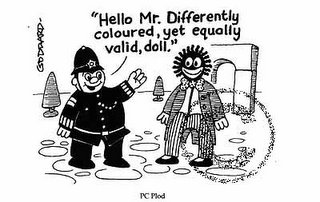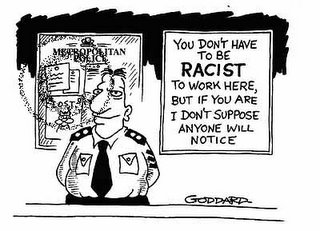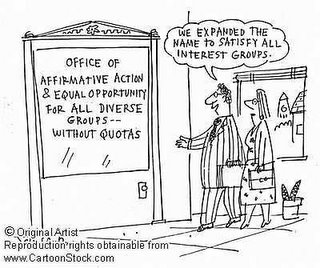2/24/2006
The birth of racism
 There are many good discussions at Orkut the last days, so let's post one here once more, about my "favourite" subject, racism. An Orkuter from Pakistan asked about the birth of racism. An American Orkuter replied that he found that a useless question and that he thought that such a topic could only lead to pseudoscience and misconceptions. He said the best would be to leave it to professionals, and he posted a link to an article: http://www.news-medical.net/?id=10415.
There are many good discussions at Orkut the last days, so let's post one here once more, about my "favourite" subject, racism. An Orkuter from Pakistan asked about the birth of racism. An American Orkuter replied that he found that a useless question and that he thought that such a topic could only lead to pseudoscience and misconceptions. He said the best would be to leave it to professionals, and he posted a link to an article: http://www.news-medical.net/?id=10415.I replied to him:
So what exactly do you not want us to talk about? I think that discussions about racism shouldn't be left to professionals only (who are these professionals that they would know all about it, by the way). It's all very interesting what the medical professionals in the article say about where prejudices are located in the brain, but that is in my opinion not the core of the problem of racism. Everyone has got prejudices, that's normal and doesn't have to be negative, it's just a way to make the complex world around us more understandable for the mind. Among the many prejudices that exist there are some which are harmful, however, these are the prejudices which are part of a belief system that different races have different characteristics, that they apply for all members of these groups, that they are unchangeable (people are imprisoned in it, determined by their fate) and that they are not equal, that your own race is superior to a different race. And it's also possible that the superioriy / inferiority judgement is not specifically based on race but e.g. on culture. When culture is assumed to be just as unchangeable as race it has the same negative consequences as "real" racism.
Do you admit that this phenomenon exists? That somebody considers his own race as superior to a different race? It's a very dangerous thing because when humans aren't considered to be equal, there isn't any moral ground available anymore to stop terror against humans. Then they can be made slaves, their human rights can be taken away completely, they can be treated as dogs or less. You don't need to be a professional to understand that problem.
I don't find it very important to trace back the first recorded case of racism, I think it's a problem of all times and places. I am not so much interested in how racism started in the history, but mostly how it starts at the individual level. What's the difference betwen harmful and non-harmful prejudices? How does it happen that people loose their flexibility and open-mindedness, that when they meet individuals who don't fit with their negative prejudices of that group, that this doesn't influence their general pricture at all? How does it happen that in the end people only see their own inventions / prejudices and don't even notice what the concrete people they meet are like? How does this work, the process of dehuminazation? How is it possible that people were brought to gaz chambers, how is it possible that people do such terrible things to each other in wars, to innocent children and women? This isn't necessarily racism of course, but just like racism, it's a process of dehumanization. If people would regard the others around them as equal human beings they could never do such awful things to each other, I think. And that's the main thing that has to be done to stop racism I think, to stop the dehumanization process and to repeat each time that all races and cultures are equal with regard to the "humanness". We are all completely human and we should always treat each other like that. In my view racism is not about biological differences between races. Racism is about one race considering another race as inferior. And instead of race the inferiority can also be based just on culture, religion etc.
Definition of racism according to Cambridge dictionaries online: The belief that people's qualities are influenced by their race and that the members of other races are not as good as the members of your own, or the resulting unfair treatment of members of other races.
Racism is just a belief, the belief doesn't have to be based on anything, real biological differences between races are irrelevant. They may exist but they cannot make one human inferior to another human in my view.
 The American Orkuter said:
The American Orkuter said:Esther, some populations are on average better at some functions then other populations. This doesn't imply an overall "superiority" or "inferiority" at all. If someone has an irrational hatred of all people identified as a "race" then that person is a racist, but if that person recognizes the medical fact of skin cancer risk in northern europeans, or malaria risk for that same population, that person isn't a racist, but simply someone who understands the reality of human bilogical differences. "Racist" implies irrational hatred. Recognizing racial differences doesn't make a person a racist, it just means that that person has pattern recognition.
I said:
I totally agree.
- Irrational hatred -> racism
- Recognition of biological differences with regard to certain features -> not racism.
So the belief that a certain race as a whole is inferior to another race, accompanied by irrational hate, and which is used to justify oppression, discrimination and exclusion, is a phenomenon which can be described as racism. And this is a very dangerous and harmful phenomenon that we should try to stop. The question of where the birth of this phenomenon comes from is an important one (with the related questions I asked), isn't it?
 Orkuter said:
Orkuter said:Good. We're on the same sheet of music here. Now, since you admit that there are different statistical appearances of certain traits in certain groups, one will also agree that one group is more likely to hold to a certain pattern of performance at a certain task (eg. sun resistance) than another group, yet there are always the statistical anomolies within each group, those at the extremes of the bell curve. This gives me a moral question: Given that any individual from a certain group could possibly perform any given task just about anywhere along the bell curve, anywhere along the full spectrum of function for that task, one must treat each individual equally, recognising that such an individual regardless of the average performance of his group at that task, could himself perform above or below that group average. Now, given that we treat all members of a group equally, inequality will form. Not all people are equal, and statistically more members of one group will perform a task better then members of another group depending on the task and the group. My given example will be the Korean War Frostbite Study discussed earlier. If we treat all members equally, we must accept that some groups will experience a higher rate of success, while others have a higher rate of failure based on that groups average performance along the bell curve for that perticular task. We see that with exactly equal treatment, exactly the same training, exactly the same equipment, and exactly the same environment and opportunities that "The Negro was proven to be at greater risk of attack by frostbite (six times) when all environmental factors were equalized. At regimental level his rate was 35.9 per 1,000 as compared to 5.8 per 1,000 for the white soldier. Negroes had more severe degrees of frostbite than did the whites."
Now, given exactly fair treatment, without any institutional racism, one must accept a different average outcome for different groups. Some of the white soldiers also get frostbite under these conditions, but five times as many black soldiers get frostbite, and much more severe cases.
My question: Is it more important to treat people as equals, and accept the results of individuals as more important then as group function, or do we accept people as members of a group, and try to give special help to members of a group that is deemed inferior at a certain task?
I will give you my answer below, but I also expect your answer.
My answer to my above question
I believe that individuals fit into groups, and statistically will fail or succeed according to the statistical averages of that group. This is a fact. I also believe that it is none of the gvmt's business how a group behaves, since it is not within the gvmt's responsibilities or capabilities to alter the biology of a group. Throwing money at a problem doesn't solve it and creates more inequality. Treat individuals as just that: Individuals. Each individual is to be recognized by the state as a member of only one group, that group being 'citizens' of the state. All citizens will then, of course, fit into an average for the entire population and be treated fairly as individuals. If the government attempts any sort of corrective measure, it should be applied across the entire population equally, as in the case of the frostbite injuries in Korea. All US Soldiers, regardless of race or whether they were from Minnesota or Mississippi were given better cold weather training in order to prevent cold weather casualties. Though only a small portion of the Norwegian kids from Minnesota were getting frostbite, no doubt that number was reduced, as would be the target group of blacks from Mississippi.
 I said:
I said:"Now, since you admit that there are different statistical appearances of certain traits in certain groups, one will also agree that one group is more likely to hold to a certain pattern of performance at a certain task (eg. sun resistance) than another group, yet there are always the statistical anomolies within each group, those at the extremes of the bell curve." No I don't agree with this. There will be differences in how different races or group cultures perform in certain fields and this leads to inequality. You want to justify this inequality on the basis of the differences in capacities of these groups. But in the first place I think that differences in capacities are not the only source of the inequality, there are also mechanisms which increase existing inequality, which is not the fault of the group that doesn't perform so well. And even if it's partly their own fault when people are poor, I still think that rich people who have the means should try to help them to develop. The question was: Is it more important to treat people as equals, or do we accept people as members of a group and try to give special help to members of a group that is deemed inferior at a certain risk? My answer: People should be treated as equals, always. But this doesn't mean that we cannot help people who need help. We don't have to give special help to certain "risk groups", there isn't any reason for that and then you could start to help people who don't need help (because the group is not homogenous). You don't have to look for the colour of ones skin, his ethnicity, the culture or religion, and what the statistical performance is like in these categories compared to other categories. You just help people who need help, independent of their background. Long term unemployed people can get some help to follow more education and to find a job, for instance by starting with an internship. When the unemployment rate in the Netherlands is much higher among Moroccans than among the Dutch, it means that relatively more Moroccans will take part in such a programme. But it doesn't mean that a special programme should be created for Moroccans...